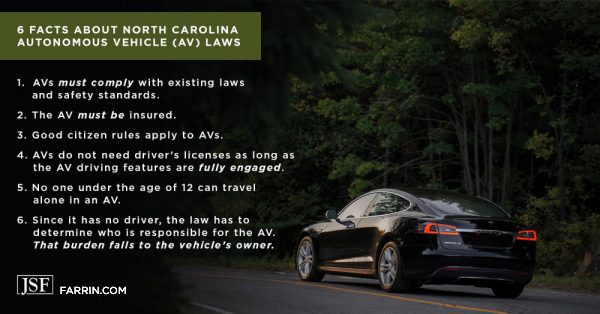It won’t be long before self-driving cars are on the streets of North Carolina. While there are not currently any vehicles for sale that are truly self-driving, the technology is getting closer. If you’ve ever been in a parking lot and watched a Tesla park itself, you know what we’re talking about.
That new technology brings up plenty of legal issues. What happens if that self-parking Tesla hits a pedestrian or another vehicle? Who is liable? Lawmakers are already wrestling with the answers to questions like these in preparation for the autonomous future. The Federal government, as of December 2019, has yet to pass any comprehensive legislation. States are left to fill that legal void, and North Carolina has passed a general statute (N.C.G.S. § 20-400—403 et seq.) to that end. Below we outline the things you should know about this law:
Six Takeaways for North Carolina Drivers According to NC State Law
- The Autonomous Vehicles (AVs) must comply with existing laws and safety standards. Autonomous technology does not excuse the vehicle from having required safety features. If a driver were to get behind the wheel, the vehicle must be street legal. The law does not excuse passengers in AVs from not wearing seat belts – those rules still apply.
- The AV must, like every other vehicle, be insured. The insurance industry will likely be developing new products to cover such vehicles, but in the meantime, the usual requirements for insurance apply.
- Good citizen rules apply to AVs. That means, in the event of a crash, the vehicle must stop, alert authorities and emergency responders, and remain on scene until released. If you’re not aware, these rules apply to all drivers, no matter what kind of vehicle they may be driving.
- AVs do not need driver’s licenses, and the passengers in them are not required to be licensed drivers – as long as the AV driving features are fully engaged. The vehicle must do the driving. If a non-licensed driver takes control of the vehicle at any time, this law is preempted by existing laws regarding unlicensed drivers.
- No one under the age of 12 can travel alone in an AV. Passengers under the age of 12 must be accompanied by an adult 18 years or older.
- Since it has no driver, the law has to determine who is responsible for the AV. That burden falls to the owner of the vehicle. While this may seem logical, it does raise interesting possibilities. For example, if an owner is halfway across the world and his or her AV causes an accident, the law considers that accident the AV owner’s responsibility.
More Considerations
The law made a number of other changes, though not directly related to the drivers, owners, or operation of AVs in the state. The law preempts local municipalities from passing laws that single out AVs for special treatment. The North Carolina law itself will likely take a back seat when Congress finally does pass Federal regulations on AVs. Recognizing the issue as complex and still-evolving, the North Carolina law established the “Fully Autonomous Vehicle Committee” within the North Carolina Department of Transportation to unpack the issues surrounding the technology moving forward.
Another area of concern is the data that is collected, stored, and used by AVs to do their work, and the privacy of that data. In a 2019 decision in Mobley v. State of Georgia, the data contained in a car’s computer required a warrant to obtain. Will Autonomous Vehicles be similarly protected, or is the nature of their systems enough for lawmakers to require their data to be immediately admissible? It may be the case that the AVs sensors are the only “witnesses” to a crash. Its computers may hold the key to unlocking the truth of a mysterious collision.
Whether you plan to own an AV or are simply a regular driver on the streets of North Carolina, it’s good to know how the law governs AVs. With recent fatalities involving cars with Semi-Autonomous Driving features, there are risks to be aware of.
Seek Representation From an Experienced NC Car Accident Attorney
At the Law Offices of James Scott Farrin, we are advocates for those who are injured in North Carolina. If you or a loved one has been injured in a crash involving an autonomous vehicle, please call us at 1-866-900-7078 or contact us for a free case evaluation. We pride ourselves on fighting for victims, and working to try to ensure they receive the compensation they deserve.
You May Also Be Interested In
Answers to the Most Frequent and Urgent Car Accident Injury Questions
Are Self-Driving Features Making the Roads More Dangerous?/a>
Who Is at Fault in a Self-Driving Car Accident?


